外研(新标准)版 七年级下 Module 12 Unit 1 It's so beautiful! 课件 (共40张PPT,无音频)
文档属性
| 名称 | 外研(新标准)版 七年级下 Module 12 Unit 1 It's so beautiful! 课件 (共40张PPT,无音频) |  | |
| 格式 | ppt | ||
| 文件大小 | 5.0MB | ||
| 资源类型 | 教案 | ||
| 版本资源 | 外研版 | ||
| 科目 | 英语 | ||
| 更新时间 | 2022-07-10 08:13:26 | ||
图片预览

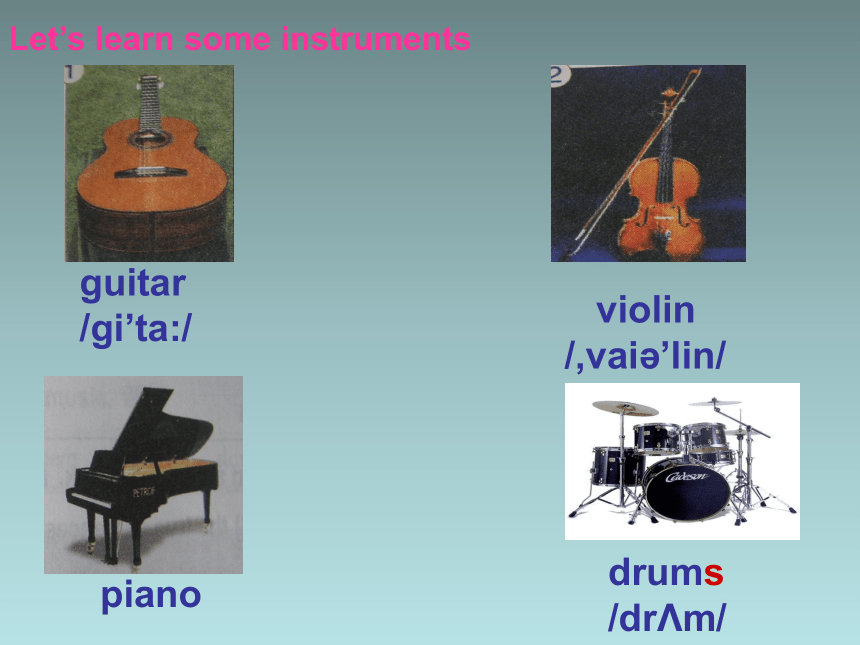
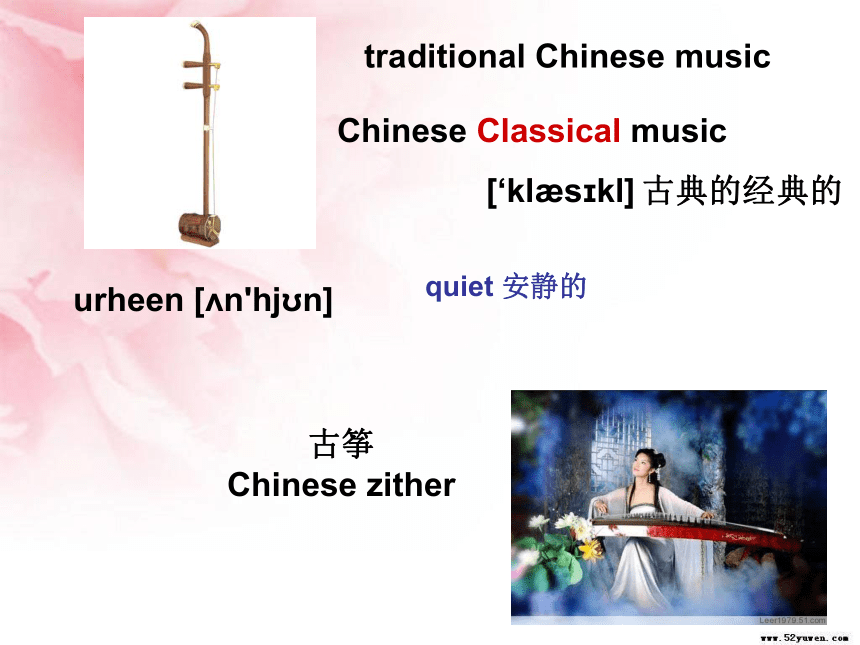
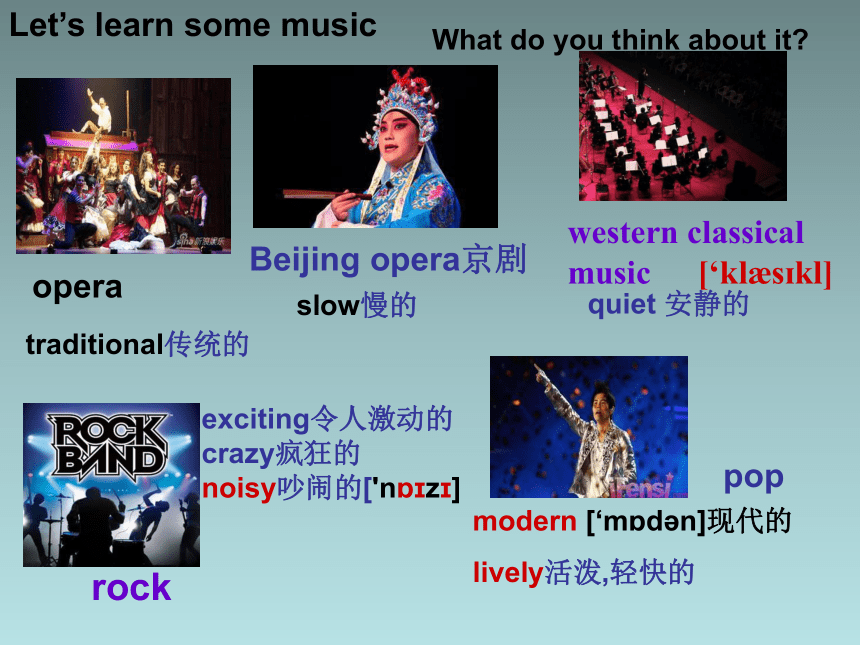

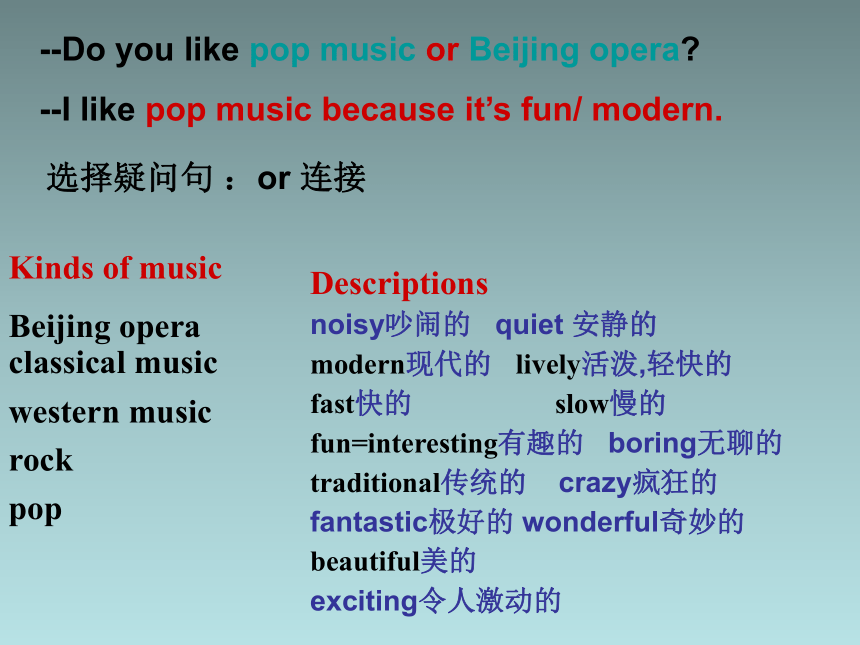
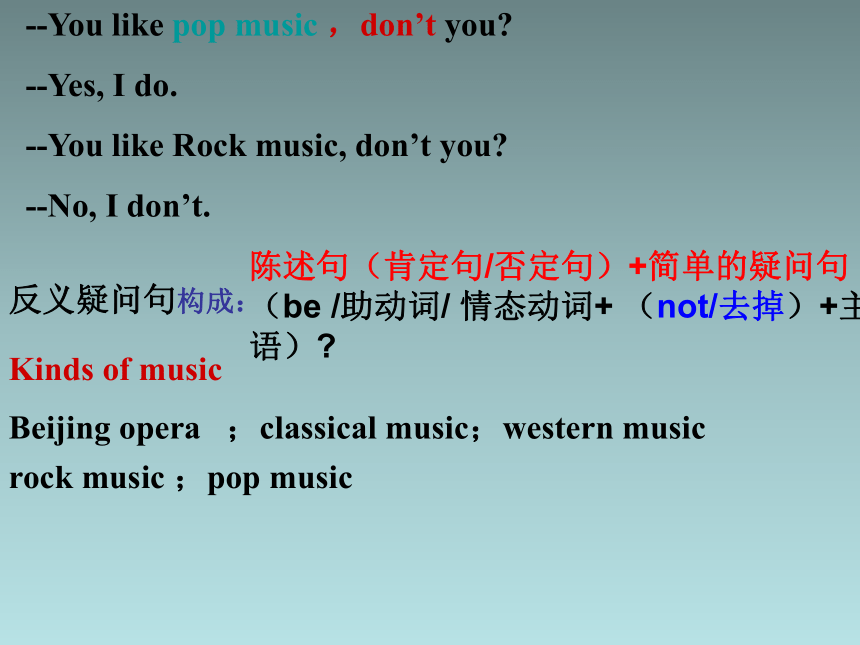
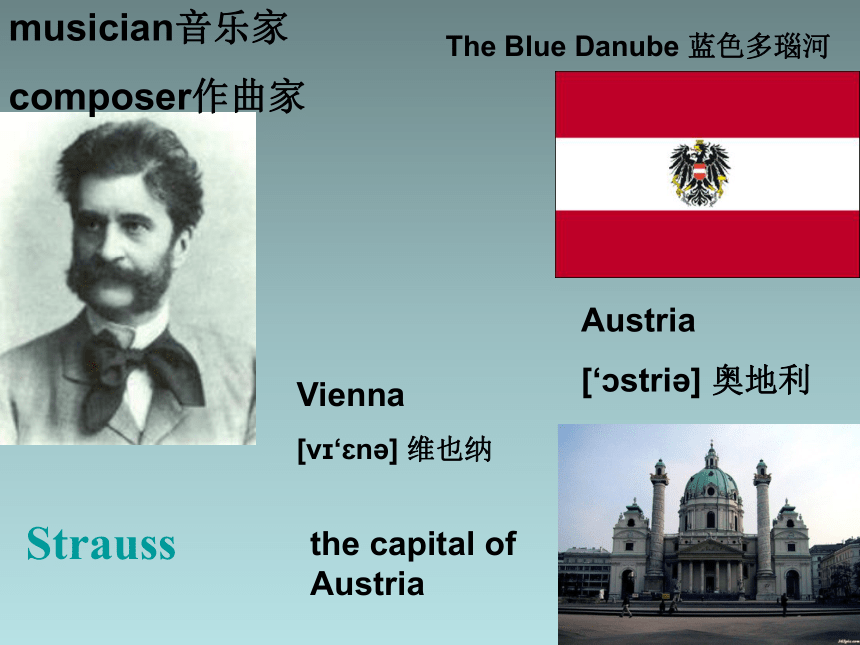
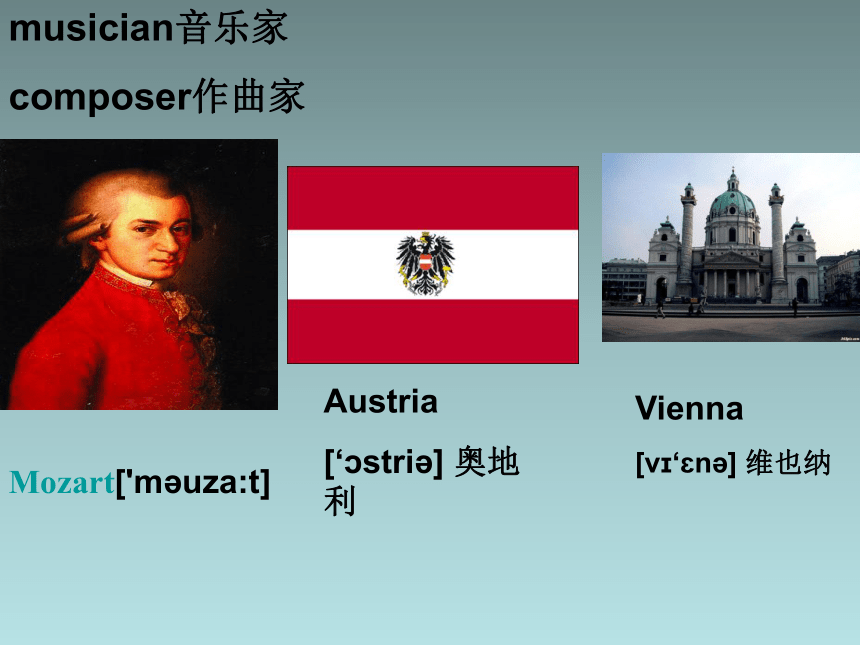
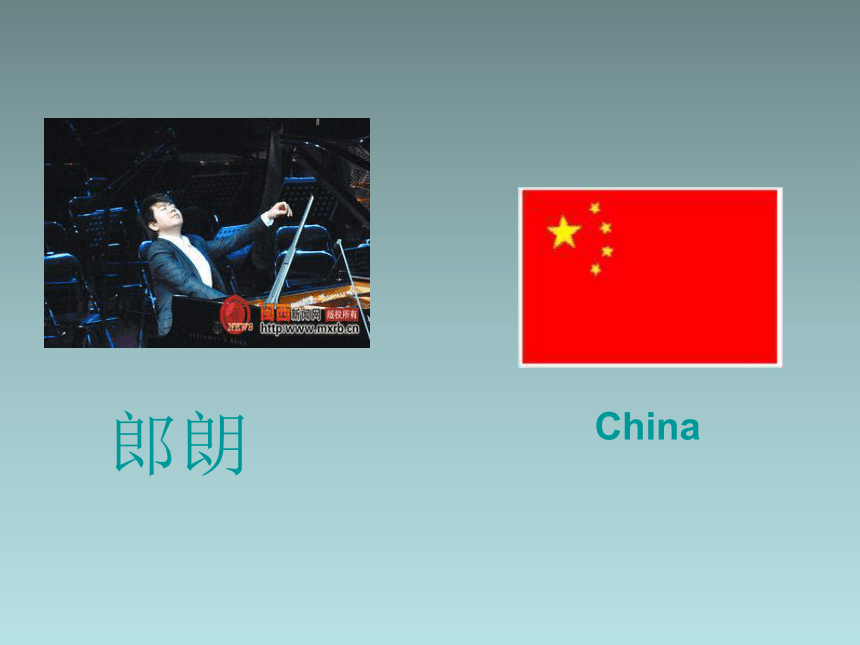
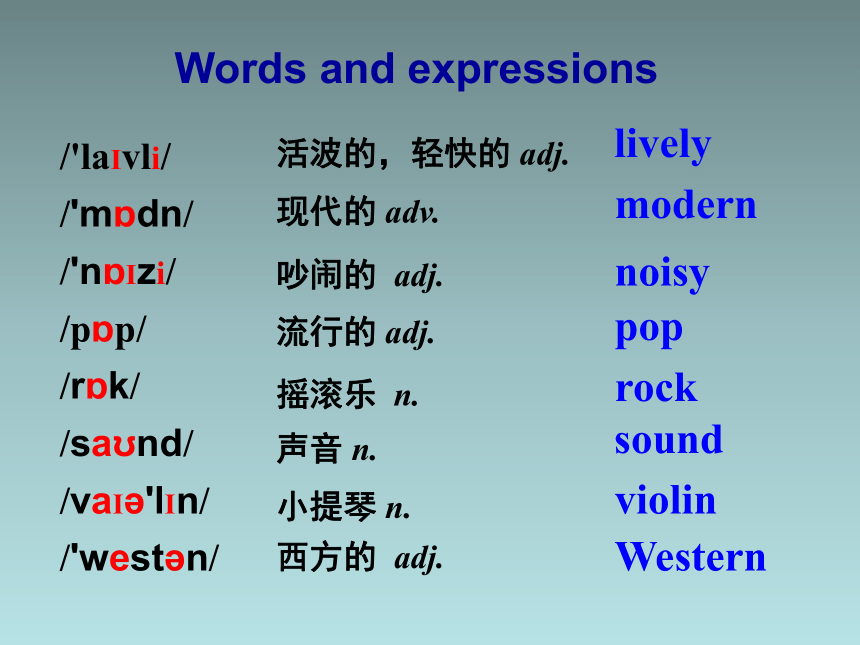
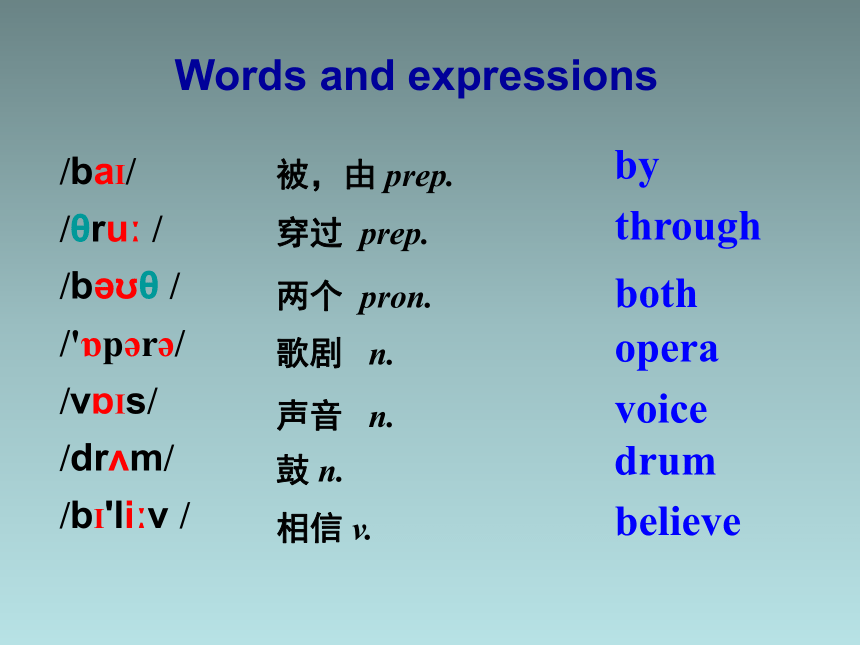
文档简介
(共40张PPT)
12
Unit 1
It’s so beautiful.
Let’s learn some instruments
guitar
/gi’ta:/
violin
/,vai ’lin/
piano
drums
/drΛm/
urheen [ n'hj n]
古筝
Chinese zither
Chinese Classical music
[‘kl s kl] 古典的经典的
traditional Chinese music
quiet 安静的
rock
western classical music [‘kl s kl]
Let’s learn some music
Beijing opera京剧
opera
pop
slow慢的
quiet 安静的
exciting令人激动的
crazy疯狂的
noisy吵闹的['n z ]
modern [‘m d n]现代的
lively活泼,轻快的
traditional传统的
What do you think about it
What kind of music do you like
I like …
Why do you like it
Because it’s …
Descriptions
noisy吵闹的 quiet 安静的
modern现代的 lively活泼,轻快的
fast快的 slow慢的
fun=interesting有趣的 boring无聊的
traditional传统的 crazy疯狂的
fantastic极好的 wonderful奇妙的
beautiful美的
exciting令人激动的
Kinds of music
Beijing opera classical music
western music
rock
pop
--Do you like pop music or Beijing opera
--I like pop music because it’s fun/ modern.
Kinds of music
Beijing opera classical music
western music
rock
pop
Descriptions
noisy吵闹的 quiet 安静的
modern现代的 lively活泼,轻快的
fast快的 slow慢的
fun=interesting有趣的 boring无聊的
traditional传统的 crazy疯狂的
fantastic极好的 wonderful奇妙的
beautiful美的
exciting令人激动的
选择疑问句 :or 连接
--You like pop music ,don’t you
--Yes, I do.
--You like Rock music, don’t you
--No, I don’t.
Kinds of music
Beijing opera ;classical music;western music
rock music ;pop music
反义疑问句构成:
陈述句(肯定句/否定句)+简单的疑问句 (be /助动词/ 情态动词+ (not/去掉)+主语)
Strauss
musician音乐家
composer作曲家
Austria
[‘ stri ] 奥地利
Vienna
[v ‘ n ] 维也纳
the capital of Austria
The Blue Danube 蓝色多瑙河
Mozart['m uza:t]
Austria
[‘ stri ] 奥地利
musician音乐家
composer作曲家
Vienna
[v ‘ n ] 维也纳
郎朗
China
/'laIvli/
/'m dn/
/'n Izi/
/p p/
/r k/
/sa nd/
/vaI 'lIn/
/'west n/
活波的,轻快的 adj.
lively
现代的 adv.
modern
吵闹的 adj.
noisy
Words and expressions
流行的 adj.
pop
rock
摇滚乐 n.
声音 n.
sound
小提琴 n.
violin
西方的 adj.
Western
/baI/
/θru /
/b θ /
/' p r /
/v Is/
/dr m/
/bI'li v /
被,由 prep.
by
穿过 prep.
through
两个 pron.
both
Words and expressions
歌剧 n.
opera
voice
声音 n.
鼓 n.
drum
相信 v.
believe
Listen and number the words as you hear them.
lively modern music
noisy pop rock
sound violin Western
1
2
3
4
5
6
7
8
9
Listen and match
What kind of music do the family like
Tony
Tony’s dad
Tony’s mum
traditional Western music
rock music
pop music
Work in pairs and answer the questions.
Which modern music does Tony like
What does Tony’s mum think about rock music
Why doesn’t Tony like traditional Western music
4 Which music does Tony’s dad think is too noisy
A. pop music B. rock music . C.western music
A. lively. B. wonderful C. modern.
A.It’s too slow. B. It’s too noisy. C. It’s too fast.
A. Pop music. B. Rock music. C. Western music.
drums
Check (√) the types of music the students like.
Tony Lingling Betty Daming
Traditional Western
music
Beijing Opera
pop
rock
Name
Music
√
√
√
√
√
√
Now check (√) the true sentences.
They’re listening to Western music.
Tony knows little about Strauss.
Strauss was born in the capital of Australia.
The Blue Danube is pop music.
Lingling enjoys Beijing opera very much.
√
√
√
×
×
(The Blue Danube)
Daming: Hmm, this is Western music, isn’t it Can
you hear the violin and the piano It’s so
beautiful! Is this by Strauss or Mozart
Lingling: I’m not sure...
Listen and read.
Western music
西方音乐
听到+结果
hear
listen to
听的过程
选择疑问句
by
A. 这首乐曲是谁的创作的?
B. 这是一本鲁迅写的书。
由……创作(编著、导演、作曲等)介词
Who is this music by
This is a book by Lu Xun.
我不确定
Betty: It's by Strauss. I love his music! Do you know
anything about him, Tony
Tony: Was he German
Betty: No, he was born in Vienna, the capital of Austria. What a beautiful city! This is called The Blue Danube. The Danube is a river in Europe. It goes through Vienna.
German
the capital of…
What a beautiful city!
go through
德国人;德国人的
复数:Germans
…的首都
多漂亮的城市!
穿过
Lingling: Do you like traditional Western music or
pop music, Betty
Betty: Well, I like both. You listen to pop music,
Lingling, don’t you
Lingling: Yes, I do. I also like Beijing opera. Listen to
this fantastic voice.
pop music
Beijing opera
流行音乐
京剧
反义疑问句
Tony: Hmm, the sound is very... different, isn’t it I’m
a fan of rock music.
Daming: Hey! Give us a break!
Lingling: Rock music Listen to those drums!
Daming: It’s so noisy! And much too fast!
Tony: You don’t like rock music I don’t believe it!
a fan of
rock music
Give us a break!
much too
…粉丝/ 迷/ 爱好者
摇滚音乐
别再烦我们
太
give sb a break
别再烦某人
much too +adj/adv.
我不相信
Western music
listen to
the capital of…
What a beautiful city!
go through
西方音乐
听
…的首都
多漂亮的城市!
穿过
流行音乐
京剧
pop music
Beijing opera
…粉丝/ 迷/ 爱好者
摇滚音乐
别再烦我们
太
a fan of
rock music
Give us a break!
much too
This is Western music, isn’t it
Is this by Strauss or Mozart
I’m not sure.
You listen to pop music, Lingling, don’t you
The sound is very... different, isn’t it
I’m a fan of rock music.
Give us a break!
I don’t believe it!
Key sentences
Read out the sentences.
1. —Jiayao is a Chinese, isn’t he
— Yes, he is.
2. — You don’t go shopping every day, do you
— No, I don’t.
3. — Qingxiao went to school last Friday,didn’t she
— Yes, she did.
4. — Weihua can ride a bike, can’t he
— Yes, he can.
5. — They haven’t been to London, have they
— No, they haven’t.
肯定陈述句
+
Is Jiayao a Chinese Yes. He is a Chinese.
Jiayao is a Chinese, isn’t he Yes, he is.
Do you go shopping every day No, I don’t.
You don’t go shopping every day, do you No, I don’t.
否 定 陈 述 句
肯定简短问句
+
反意疑问句
概念:当我们陈述一个事实,而又不是很有把握,就可以在陈述句后加
一 个简短问句,称为反意疑问句。
陈述句+简短问句〖助动词/系动词be/情态动词+主语(代词)〗
陈述句是肯定的,简短问句用否定形式;而陈述句是否定的,
简短问句就用肯定形式;(前肯后否,前否后肯)
……… , 对吧/是吧
简短问句
否定
对,他是的
对, 我不是
反意疑问句:
反意疑问句:
一般疑问句:
一般疑问句:
构成:
意义:
回答:
按事实回答
一、Choose the best answers:
( )1. Tom works in a big foreign company,
A. does he B. doesn’t he C. is Tom D. does Tom
( )2. Ling Shi went to the office yesterday,
A. was he B. is he C. did he D. didn’t he
( )3. You’re a student,
A. are you B. aren’t you C. do you D. don’t you
( )4. Jack and Mike can go there by themselves,
A. can’t Jack and Mike B. can Jack and Mike
C. can’t they D. can they
( )5. —The housing price isn’t very high in Guangzhou, is it
— . Many people can’t buy a house at that price.
A. Yes, it is B. Yes, it isn’t C. No, it is D. No, it isn’t
B
D
B
C
A
1.It’s a heavy desk,
2.I sent him an email yester day,
3.Sally plays the violin well,
4.Chen Hua doesn’t like rap music,
5.Dave’s gone to London,
6.They can’t play the guitar there,
7.Lin Wei dropped out of school a month
ago,
8.Sam shouldn’t drop chalk on the
floor,
isn’t it
didn’t I
doesn’t she
does he
hasn’t he
can they
didn’t he
should he
A. What a beautiful bird it is!
B. How beautiful this bird is!
A. What beautiful flowers they are!
B. How beautiful these flowers are!
Work out the rules:
What 与 How 大转换
1. What a pretty girl she is!
_______ _______ the girl is!
2. How difficult the questions are!
_________ ________ ________ they are.
3. How big the factory is!
_______ _______ big factory _____ ____!
How pretty
What difficult questions
What a
it is
4.What a clever boy!
_______ _______ the boy _______!
5. How tall the trees are!
_______ tall trees ______ ______!
6. What interesting books they are!
________ _______ the books ________!
7. How funny the girl is!
________ a funny girl she is!
How clever
are
What
How interesting
What
they are
is
-- Is this by Strauss or Mozart
-- It’s by Strauss.
-- Do you like traditional Western music or pop music
-- Well, I like both.
以上这种在问句中提供两组或以上可选答案的问句叫做选择疑问句。语调为先升后降。对于这样的问句不能用yes或者no来回答,应该选其中一个或者同时都选或者不知道。而且这里的or所连接的内容是一个并列关系,词性应该统一。
5. Complete the sentences with the following words.
1.Strauss wasn’t __________ . He came from Austria.
2.Darning thinks the _________ in rock music are too _______.
3.Tony can’t __________ that Darning doesn’t like rock music.
4.Betty likes __________ traditional Western music and pop music.
5.Tony thinks the sound of the __________ in Beijing opera is very different.
believe both drum German noisy voice
German
drums
noisy
believe
both
voice
Language points
1. Is this by Strauss or Mozart 是这是谁创作的?
这里的by是介词,意思是“由……创作(编著、导演、作曲等)”。
e.g. A. 这首乐曲是谁的创作的?
B. 这是一本鲁迅写的书。
2. I’m (not) sure. 我(不)确定。
e.g. A. 我肯定他今天下午会来。
B. 他不确定谁会赢得这场比赛。
3. the capital of… ……的首都
e.g. A. 北京是中国的首都。
B.伦敦是英国的首都吗?
Who is this music by
This is a book by Lu Xun.
I’m sure he’ll come this afternoon.
He is not sure who will win the match.
Beijing is the capital of China.
Is London the capital of England
4. traditional Beijing Opera 传统的京剧
e.g. 你听说过传统的京剧吗
5. a fan of… ……迷/爱好者
e.g. A. 他妈妈是个古典音乐爱好者。
B. 我的同桌是个足球迷。
6. Give us a break. 本意是:让我们休息一会儿。
引申为:别再烦我们了(让我们清静一会儿吧)!
e.g. 别再烦他了,他正在做作业呢。
Have you heard of traditional Beijing Opera
His mother is a fan of classical music.
My deskmate is a fan of football.
Give him a break. He is doing his homework.
7.on earth 究竟,到底——常用于疑问词(what,when,where,who)的后面,用以加强语气;也可用在否定词的后面,用以加强否定的语气。
e.g. A.你到底在干什么?
B.明天究竟谁值日?
8.I don’t believe it! 我不相信。
e.g.我不相信他所说的.
What on earth are you doing
Who on earth is on duty tomorrow
I don’t believe what he said.
e.g. Nothing on earth can make him change his mind.
无论什么都不能让他改变主意。
Review the new words and expressions in the passage.
12
Unit 1
It’s so beautiful.
Let’s learn some instruments
guitar
/gi’ta:/
violin
/,vai ’lin/
piano
drums
/drΛm/
urheen [ n'hj n]
古筝
Chinese zither
Chinese Classical music
[‘kl s kl] 古典的经典的
traditional Chinese music
quiet 安静的
rock
western classical music [‘kl s kl]
Let’s learn some music
Beijing opera京剧
opera
pop
slow慢的
quiet 安静的
exciting令人激动的
crazy疯狂的
noisy吵闹的['n z ]
modern [‘m d n]现代的
lively活泼,轻快的
traditional传统的
What do you think about it
What kind of music do you like
I like …
Why do you like it
Because it’s …
Descriptions
noisy吵闹的 quiet 安静的
modern现代的 lively活泼,轻快的
fast快的 slow慢的
fun=interesting有趣的 boring无聊的
traditional传统的 crazy疯狂的
fantastic极好的 wonderful奇妙的
beautiful美的
exciting令人激动的
Kinds of music
Beijing opera classical music
western music
rock
pop
--Do you like pop music or Beijing opera
--I like pop music because it’s fun/ modern.
Kinds of music
Beijing opera classical music
western music
rock
pop
Descriptions
noisy吵闹的 quiet 安静的
modern现代的 lively活泼,轻快的
fast快的 slow慢的
fun=interesting有趣的 boring无聊的
traditional传统的 crazy疯狂的
fantastic极好的 wonderful奇妙的
beautiful美的
exciting令人激动的
选择疑问句 :or 连接
--You like pop music ,don’t you
--Yes, I do.
--You like Rock music, don’t you
--No, I don’t.
Kinds of music
Beijing opera ;classical music;western music
rock music ;pop music
反义疑问句构成:
陈述句(肯定句/否定句)+简单的疑问句 (be /助动词/ 情态动词+ (not/去掉)+主语)
Strauss
musician音乐家
composer作曲家
Austria
[‘ stri ] 奥地利
Vienna
[v ‘ n ] 维也纳
the capital of Austria
The Blue Danube 蓝色多瑙河
Mozart['m uza:t]
Austria
[‘ stri ] 奥地利
musician音乐家
composer作曲家
Vienna
[v ‘ n ] 维也纳
郎朗
China
/'laIvli/
/'m dn/
/'n Izi/
/p p/
/r k/
/sa nd/
/vaI 'lIn/
/'west n/
活波的,轻快的 adj.
lively
现代的 adv.
modern
吵闹的 adj.
noisy
Words and expressions
流行的 adj.
pop
rock
摇滚乐 n.
声音 n.
sound
小提琴 n.
violin
西方的 adj.
Western
/baI/
/θru /
/b θ /
/' p r /
/v Is/
/dr m/
/bI'li v /
被,由 prep.
by
穿过 prep.
through
两个 pron.
both
Words and expressions
歌剧 n.
opera
voice
声音 n.
鼓 n.
drum
相信 v.
believe
Listen and number the words as you hear them.
lively modern music
noisy pop rock
sound violin Western
1
2
3
4
5
6
7
8
9
Listen and match
What kind of music do the family like
Tony
Tony’s dad
Tony’s mum
traditional Western music
rock music
pop music
Work in pairs and answer the questions.
Which modern music does Tony like
What does Tony’s mum think about rock music
Why doesn’t Tony like traditional Western music
4 Which music does Tony’s dad think is too noisy
A. pop music B. rock music . C.western music
A. lively. B. wonderful C. modern.
A.It’s too slow. B. It’s too noisy. C. It’s too fast.
A. Pop music. B. Rock music. C. Western music.
drums
Check (√) the types of music the students like.
Tony Lingling Betty Daming
Traditional Western
music
Beijing Opera
pop
rock
Name
Music
√
√
√
√
√
√
Now check (√) the true sentences.
They’re listening to Western music.
Tony knows little about Strauss.
Strauss was born in the capital of Australia.
The Blue Danube is pop music.
Lingling enjoys Beijing opera very much.
√
√
√
×
×
(The Blue Danube)
Daming: Hmm, this is Western music, isn’t it Can
you hear the violin and the piano It’s so
beautiful! Is this by Strauss or Mozart
Lingling: I’m not sure...
Listen and read.
Western music
西方音乐
听到+结果
hear
listen to
听的过程
选择疑问句
by
A. 这首乐曲是谁的创作的?
B. 这是一本鲁迅写的书。
由……创作(编著、导演、作曲等)介词
Who is this music by
This is a book by Lu Xun.
我不确定
Betty: It's by Strauss. I love his music! Do you know
anything about him, Tony
Tony: Was he German
Betty: No, he was born in Vienna, the capital of Austria. What a beautiful city! This is called The Blue Danube. The Danube is a river in Europe. It goes through Vienna.
German
the capital of…
What a beautiful city!
go through
德国人;德国人的
复数:Germans
…的首都
多漂亮的城市!
穿过
Lingling: Do you like traditional Western music or
pop music, Betty
Betty: Well, I like both. You listen to pop music,
Lingling, don’t you
Lingling: Yes, I do. I also like Beijing opera. Listen to
this fantastic voice.
pop music
Beijing opera
流行音乐
京剧
反义疑问句
Tony: Hmm, the sound is very... different, isn’t it I’m
a fan of rock music.
Daming: Hey! Give us a break!
Lingling: Rock music Listen to those drums!
Daming: It’s so noisy! And much too fast!
Tony: You don’t like rock music I don’t believe it!
a fan of
rock music
Give us a break!
much too
…粉丝/ 迷/ 爱好者
摇滚音乐
别再烦我们
太
give sb a break
别再烦某人
much too +adj/adv.
我不相信
Western music
listen to
the capital of…
What a beautiful city!
go through
西方音乐
听
…的首都
多漂亮的城市!
穿过
流行音乐
京剧
pop music
Beijing opera
…粉丝/ 迷/ 爱好者
摇滚音乐
别再烦我们
太
a fan of
rock music
Give us a break!
much too
This is Western music, isn’t it
Is this by Strauss or Mozart
I’m not sure.
You listen to pop music, Lingling, don’t you
The sound is very... different, isn’t it
I’m a fan of rock music.
Give us a break!
I don’t believe it!
Key sentences
Read out the sentences.
1. —Jiayao is a Chinese, isn’t he
— Yes, he is.
2. — You don’t go shopping every day, do you
— No, I don’t.
3. — Qingxiao went to school last Friday,didn’t she
— Yes, she did.
4. — Weihua can ride a bike, can’t he
— Yes, he can.
5. — They haven’t been to London, have they
— No, they haven’t.
肯定陈述句
+
Is Jiayao a Chinese Yes. He is a Chinese.
Jiayao is a Chinese, isn’t he Yes, he is.
Do you go shopping every day No, I don’t.
You don’t go shopping every day, do you No, I don’t.
否 定 陈 述 句
肯定简短问句
+
反意疑问句
概念:当我们陈述一个事实,而又不是很有把握,就可以在陈述句后加
一 个简短问句,称为反意疑问句。
陈述句+简短问句〖助动词/系动词be/情态动词+主语(代词)〗
陈述句是肯定的,简短问句用否定形式;而陈述句是否定的,
简短问句就用肯定形式;(前肯后否,前否后肯)
……… , 对吧/是吧
简短问句
否定
对,他是的
对, 我不是
反意疑问句:
反意疑问句:
一般疑问句:
一般疑问句:
构成:
意义:
回答:
按事实回答
一、Choose the best answers:
( )1. Tom works in a big foreign company,
A. does he B. doesn’t he C. is Tom D. does Tom
( )2. Ling Shi went to the office yesterday,
A. was he B. is he C. did he D. didn’t he
( )3. You’re a student,
A. are you B. aren’t you C. do you D. don’t you
( )4. Jack and Mike can go there by themselves,
A. can’t Jack and Mike B. can Jack and Mike
C. can’t they D. can they
( )5. —The housing price isn’t very high in Guangzhou, is it
— . Many people can’t buy a house at that price.
A. Yes, it is B. Yes, it isn’t C. No, it is D. No, it isn’t
B
D
B
C
A
1.It’s a heavy desk,
2.I sent him an email yester day,
3.Sally plays the violin well,
4.Chen Hua doesn’t like rap music,
5.Dave’s gone to London,
6.They can’t play the guitar there,
7.Lin Wei dropped out of school a month
ago,
8.Sam shouldn’t drop chalk on the
floor,
isn’t it
didn’t I
doesn’t she
does he
hasn’t he
can they
didn’t he
should he
A. What a beautiful bird it is!
B. How beautiful this bird is!
A. What beautiful flowers they are!
B. How beautiful these flowers are!
Work out the rules:
What 与 How 大转换
1. What a pretty girl she is!
_______ _______ the girl is!
2. How difficult the questions are!
_________ ________ ________ they are.
3. How big the factory is!
_______ _______ big factory _____ ____!
How pretty
What difficult questions
What a
it is
4.What a clever boy!
_______ _______ the boy _______!
5. How tall the trees are!
_______ tall trees ______ ______!
6. What interesting books they are!
________ _______ the books ________!
7. How funny the girl is!
________ a funny girl she is!
How clever
are
What
How interesting
What
they are
is
-- Is this by Strauss or Mozart
-- It’s by Strauss.
-- Do you like traditional Western music or pop music
-- Well, I like both.
以上这种在问句中提供两组或以上可选答案的问句叫做选择疑问句。语调为先升后降。对于这样的问句不能用yes或者no来回答,应该选其中一个或者同时都选或者不知道。而且这里的or所连接的内容是一个并列关系,词性应该统一。
5. Complete the sentences with the following words.
1.Strauss wasn’t __________ . He came from Austria.
2.Darning thinks the _________ in rock music are too _______.
3.Tony can’t __________ that Darning doesn’t like rock music.
4.Betty likes __________ traditional Western music and pop music.
5.Tony thinks the sound of the __________ in Beijing opera is very different.
believe both drum German noisy voice
German
drums
noisy
believe
both
voice
Language points
1. Is this by Strauss or Mozart 是这是谁创作的?
这里的by是介词,意思是“由……创作(编著、导演、作曲等)”。
e.g. A. 这首乐曲是谁的创作的?
B. 这是一本鲁迅写的书。
2. I’m (not) sure. 我(不)确定。
e.g. A. 我肯定他今天下午会来。
B. 他不确定谁会赢得这场比赛。
3. the capital of… ……的首都
e.g. A. 北京是中国的首都。
B.伦敦是英国的首都吗?
Who is this music by
This is a book by Lu Xun.
I’m sure he’ll come this afternoon.
He is not sure who will win the match.
Beijing is the capital of China.
Is London the capital of England
4. traditional Beijing Opera 传统的京剧
e.g. 你听说过传统的京剧吗
5. a fan of… ……迷/爱好者
e.g. A. 他妈妈是个古典音乐爱好者。
B. 我的同桌是个足球迷。
6. Give us a break. 本意是:让我们休息一会儿。
引申为:别再烦我们了(让我们清静一会儿吧)!
e.g. 别再烦他了,他正在做作业呢。
Have you heard of traditional Beijing Opera
His mother is a fan of classical music.
My deskmate is a fan of football.
Give him a break. He is doing his homework.
7.on earth 究竟,到底——常用于疑问词(what,when,where,who)的后面,用以加强语气;也可用在否定词的后面,用以加强否定的语气。
e.g. A.你到底在干什么?
B.明天究竟谁值日?
8.I don’t believe it! 我不相信。
e.g.我不相信他所说的.
What on earth are you doing
Who on earth is on duty tomorrow
I don’t believe what he said.
e.g. Nothing on earth can make him change his mind.
无论什么都不能让他改变主意。
Review the new words and expressions in the passage.
同课章节目录
- Module 1 Lost and found
- Unit 1 Whose bag is this?
- Unit 2 Are they yours?
- Unit 3 Language in use
- Module 2 What can you do ?
- Unit 1 I can play the piano
- Unit 2 I can run really fast
- Unit 3 Language in use
- Module 3 Making plans
- Unit 1 What are you going to do at the weekends?
- Unit 2 We're going to cheer the players.
- Unit 3 Language in use
- Module 4 Life in the future
- Unit 1 Everyone will study at home
- Unit 2 Every family will have a small plane.
- Unit 3 Language in use
- Module 5 Shopping
- Unit 1 What can I do for you?
- Unit 2 You can buy everything on the Internet
- Unit 3 Language in use
- Module 6 Around town
- Unit 1 Could you tell me how to get to the Nationa
- Unit 2 The London Eye is on your right.
- Unit 3 Language in use
- Revision module A
- Module 7 My past life
- Unit 1 I was born in a small village.
- Unit 2 I was born in Quincy.
- Unit 3 Language in use
- Module 8 Story time
- Unit 1 Once upon a time….
- Unit 2 Goldilocks hurried out of the house.
- Unit 3 Language in use
- Module 9 Life history
- Unit 1 He left school and began work at the age of
- Unit 2 He decided to be an actor.
- Unit 3 Language in use
- Module 10 A holiday journey
- Unit 1 What did you do?
- Unit 2 This morning we took a walk.
- Unit 3 Language in use
- Module 11 Body language
- Unit 1 They touch noses!
- Unit 2 Here are some ways to welcome them.
- Unit 3 Language in use
- Module 12 Western music
- Unit 1 It's so beautiful!
- Unit 2 Vienna is the centre of European classical
- Unit 3 Language in use
- Revision module B
